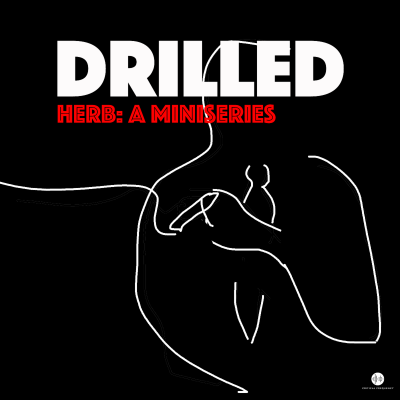Amy Westervelt / Critical FrequencyClient Information
18 July, 2023Print

Drilled Podcast Miniseries Explores Big Oil’s Insidious Influence on Corporate Free Speech
Why do companies—oil companies especially—spend so much money producing feel-good ads that seem unrelated to what the companies actually do? Inspiring messages about female athletes from Chevron, an ode to the power of teachers from crude oil producer Conoco Philips, Aramco’s multi-million-dollar purchase of a professional soccer team in the UK. These (real) marketing programs, and many more like them, are not so much about being a good corporate citizen as they are about seeming like a citizen, period. Someone with ideas and policy positions, morals and ethics. A philosophy. A reputation. And, most importantly, a personality.
Today, the award-winning climate podcast Drilled launches a three-part miniseries titled “Herb,” exploring how, for decades, fossil fuel companies have quietly led the charge to expand not just the definition of corporate free speech, but also the legal protections for it, up to including the Citizens United case. When candidate Mitt Romney told a crowd “corporations are people” in 2011, it was treated as a potentially campaign-ending gaffe. But oil companies have been promoting that exact philosophy all along.
“Herb” takes its title from Herb Schmertz, the Mobil Oil VP who got the oil guys into the corporate free speech business in the 1970s. Host Amy Westervelt uncovers how his work influences all this nefarious feel-good messaging from oil companies today and explores Mobil's (and then ExxonMobil's) role in setting the legal foundation for the expansion of corporate free speech in Supreme Court cases from Bellotti to Citizens United. Today, oil company lawyers are looking to further expand corporate free speech protections, making the argument in more than two dozen climate cases that everything oil companies have ever said about climate change is protected speech, including statements they knew were misleading. Legal analysts familiar with these cases have begun echoing what Westervelt has said all along: the next Citizens United will probably be a climate case.
“As soon as I saw that oil companies had appointed First Amendment experts, not liability experts, as lead counsel in the climate cases, I figured these cases would ultimately hinge on a free speech argument,” Westervelt says. “What I did not know, and few did, was that fossil fuel companies had played an integral role in creating the whole idea of corporate free speech in the first place.”
Listen to Episode 1, “The Panic,” wherever you get podcasts. Episode 2, “A Legal Victory,” will be out July 25 and Episode 3, “Moving the Goalposts,” will be out August 1.
Drilled is one of the few narrative podcasts about climate change. In 2018 when journalist Amy Westervelt was covering multiple climate lawsuits, she had the idea to put the story of climate change, and climate denial, into a true-crime framework. Season 1 (November 2018) focused on the climate research conducted by oil companies and when and how they shifted from studying the problem to denying it. Season 2 (April 2019) followed a community of crab fishermen as they became the first industry to sue Big Oil. Season 3 (January 2020) chronicled the 100-year history of fossil fuel P.R. campaigns and ties them to the propaganda we still see today. Season 4 looked at how the fossil fuel industry used the Covid-19 pandemic to roll back regulation, and Season 5 chronicled the decades-long legal battle between indigenous groups in the Ecuadorian Amazon and Chevron. Season 6 looked at the link between the fracking boom and the plastics boom. Season 7, a collaboration with Earther, delved into the way fossil fuel companies have invaded schools, from kindergarten through to university, and to what ends. Ad Season 8 chronicled the emergence and rapid growth of a new oil industry in Guyana, via the government’s partnership with ExxonMobil. Multiple future seasons are already in the works for the year to come. What began as a limited-run 8-part series has become the most listened-to podcast on climate change.
Amy Westervelt is an award-winning investigative journalist and executive producer of the independent podcast production company Critical Frequency, which specializes in reported narrative podcasts. In 2020 she was executive producer of Unfinished: Short Creek, a co-production between Critical Frequency and Stitcher that was named one of the best podcasts of the year by The New Yorker and The Atlantic, and received a Wilbur award for excellence in religion reporting. In 2021, she led the reporting and production teams of This Land S2—an investigative, narrative season revealing the various forces behind efforts to unravel tribal sovereignty in the U.S.—which was nominated in April 2022 for a Peabody Award. Her investigative climate podcast Drilled, a Critical Frequency original production, was awarded the Online News Association award for excellence in audio journalism in 2019 and Covering Climate Now's award for excellence in audio journalism in 2021. In 2015, Amy received a Rachel Carson award for women greening journalism, for her role in creating a women-only climate journalism group syndicating longform climate reporting to The Atlantic, The Guardian, The Economist, and many more outlets. A 20-year veteran investigative journalist, Westervelt's earlier work for NPR, The Washington Post, The Wall Street Journal, Inside Climate News, and various other outlets earned her Edward R. Murrow, ONA, and Folio awards as well, and is often cited as amongst the earliest examples of accountability reporting on climate.
For more information about Drilled, please contact Ray Padgett (raypadgett@shorefire.com) or Mark Satlof (msatlof@shorefire.com) at Shore Fire Media.
